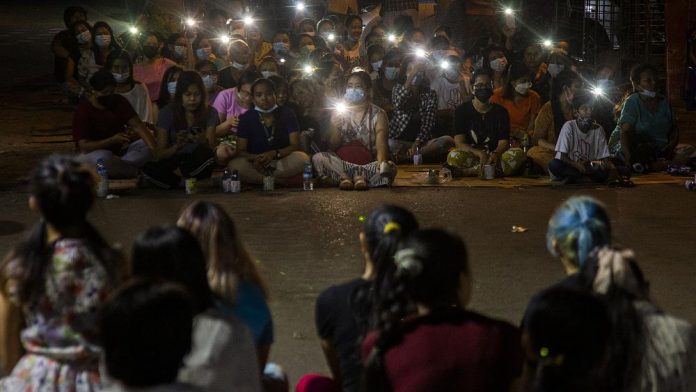Myanmar has endured nightly internet shutdowns for more than a month as anti-coup demonstrations continue.
Since the military seized power and detained elected leaders on February 1, at least 149 people have been killed, according to the UN.
On Tuesday night, internet access in Myanmar was shut down for the 31st consecutive night, according to internet monitoring service Netblocks.
These blackouts have occurred systematically and typically between 01:00 and 09:00 local time every night, with no official explanation. Myanmar’s military has previously blocked access to Facebook for “safety” reasons.
Meanwhile, Netblocks have observed that while fixed-line internet has been restored after each shutdown, mobile internet remained restricted. From Sunday night, analysis of cellular networks shows that mobile networks remain disabled nationwide.
Alp Toker, the founder of Netblocks, told Euronews that the loss of mobile internet was a “really severe development”.
“Myanmar is a country that relies on mobile internet, especially at protests, but also in day-to-day life around the country,” Toker said.
“The infrastructure of fixed-line internet in Myanmar is not that good, the country has leapfrogged straight to fast internet and 4G.”
Since the military coup, thousands of videos have appeared or been streamed on social media, showing alleged human rights violations by security forces.
But Alp Toker says that the internet shutdowns have brought the situation to a “standstill” and mean that these videos can be “lost in the noise”.
“You don’t get the human rights reporting, you don’t get the news coverage, it means the world doesn’t know what is going on the ground in the country.”
Netblocks also say that the loss of mobile data service could be an added danger to citizens who record videos showing security forces attacking demonstrators but cannot upload them.
“If you don’t transmit that immediately, it actually puts you at risk as an activist because you are now carrying evidence that might incriminate the military or an officer,” said Toker.
“It makes the person who recorded the video a potential target themselves, so it has an accumulative knock-on effect.”
“You’re almost better off not having a phone in that context.”
The United Nations and other regional bodies have urged measures to reconcile the protesters and military and bring an end to the violence.
“I’m appalled by the escalating violence in Myanmar at the hands of the military,” tweeted the UN’s Secretary-General António Guterres
“I urge the international community to work collectively and bilaterally to help bring an end to the repression.”
France’s Foreign Minister Jean-Yves Le Drian told reporters on Tuesday that the European Union will approve sanctions in Myanmar at next week’s foreign ministers’ meeting.
Le Drian said those sanctions will suspend all budgetary support and target the economic interests of individuals involved in the coup.
However, the internet outages continue to disrupt efforts to document the reality of the military’s actions against pro-democracy voices.
“There’s no end in sight,” said Alp Toker, “this is an ongoing restriction in Myanmar.”
Source : euronews
















